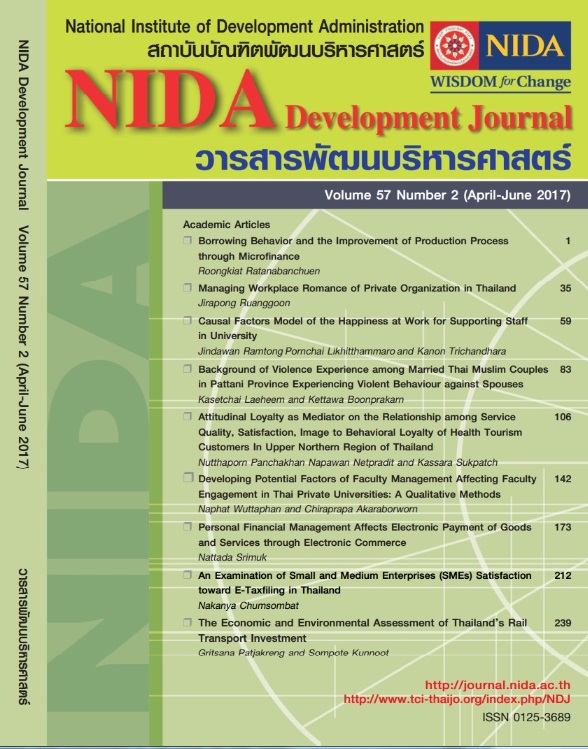The Economic and Environmental Assessment of Thailand’s Rail Transport Investment (การประเมินผลทางด้านเศรษฐกิจและสิ่งแวดล้อมจากการลงทุน โครงสร้างพื้นฐานการขนส่งทางรางของประเทศไทย)
Keywords:
Rail transport, Fuel efficiency, CGE Model, CO2 emissions, การขนส่งทางราง, ประสิทธิภาพการใช้น้ำมัน, การปล่อยก๊าซคาร์บอนไดออกไซค์Abstract
In the present study a CGE model was used to assess Thailand’s plan for rail transport investment in terms of changes in the economy and regarding CO2 emissions. Aggregate economic impact is described in terms of change in real GDP and a number of macro indicators. Economic impacts also involve change in the economic structure created by differences in the strength of change at the micro level. Environmental impact is expressed in terms of change in CO2 emissions, coupled with the petroleum consumption of different production. Change in petroleum consumption is brought about by changes in the components of the economic system at macro and micro levels. This study found that rail investment produces a positive change in real GDP, which summarizes both the appreciation and depreciation of economic components. Moreover, rail investment induced a shift in the transportation method in favor of rail transport, which is allegedly regarded as more energy efficient. The saving of CO2 emissions is a product of this shift. Understanding potential economic and environmental impacts contributes to confidence and rationale for rail investment.
บทคัดย่อ
การศึกษานี้เป็นการประยุกต์ใช้แบบจำลองคำนวณดุลยภาพทั่วไปเพื่อประเมินผลการเปลี่ยนแปลงทางด้านเศรษฐกิจและสิ่งแวดล้อมจากการลงทุนโครงสร้างพื้นฐานการขนส่งทางราง ซึ่งสามารถสะท้อนผ่านการเปลี่ยนแปลงของผลิตภัณฑ์มวลรวมภายในประเทศที่แท้จริงและปริมาณการปล่อยก๊าซคาร์บอนไดออกไซค์ที่เกิดจากการบริโภคน้ำมันเชื้อเพลิง การลงทุนโครงสร้างพื้นฐานการขนส่งทางรางส่งผลให้เศรษฐกิจโดยรวมของประเทศเติบโตมากขึ้นซึ่งเป็นผลมาจากการที่ต้นทุนและราคาของสินค้าและบริการในระบบเศรษฐกิจโดยรวมลดลง ในขณะเดียวกันยังส่งผลประโยชน์ให้การใช้น้ำมันเชื้อเพลิงในภาคการขนส่งมีประสิทธิภาพมากขึ้น เนื่องจากมีการปรับเปลี่ยนรูปแบบจากการขนส่งทางถนนมาสู่การขนส่งทางรางเพิ่มขึ้น ทั้งนี้ประสิทธิภาพการใช้น้ำมันเชื้อเพลิงที่สูงขึ้นยังส่งผลให้ปริมาณการปล่อยก๊าซคาร์บอนไดออกไซด์ลดลงซึ่งแปรผันตามปริมาณการบริโภคน้ำมันเชื้อเพลิง ดังนั้นการลงทุนโครงสร้างพื้นฐานการขนส่งทางรางจึงมีผลประโยชน์ทั้งทางด้านเศรษฐกิจและสิ่งแวดล้อม และสามารถนำไปใช้เป็นแนวทางในการกำหนดนโยบายการลงทุนของภาครัฐที่มีการพิจารณาถึงผลกระทบทางด้านเศรษฐกิจและสิ่งแวดล้อม





